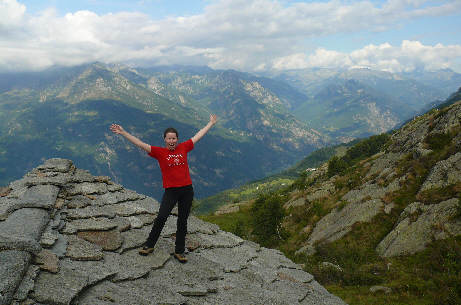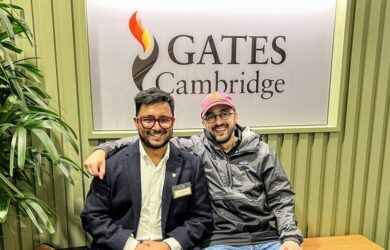
Mary Beth Day's research will feature on two BBC programmes.
A year ago Mary Beth Day [2009] spent several weeks being driven around Cambodia’s ancient city of Angkor in a tuk tuk, a rickshaw-like vehicle, collecting sediment samples.
Her work was part of a research project which drew headlines in the New York Times and the Christian Science Monitor for its finding that drought may have been a major factor in the collapse of the ancient city.
The research was recently published in the Proceedings of the National Academy of Science and will also feature on the BBC World Service’s Science in Action programme on 12th January and on Radio Four’s Material World on 19th January.
“It’s been pretty crazy with all the publicity,” admits Mary Beth. “You don’t expect that your PhD research will get you into the New York Times, but Cambodia is such an interesting place.”
Mary Beth grew up in Seneca Falls in New York state. Her father was a chemical engineer and her mother a librarian. She has an older sister who works for a land trust in the US.
She says one of the major turning points in her life came when she was around 15 and went on a girl guides summer programme in Nebraska. She met with geologists and travelled around, learning what they do. “It was super fun and exciting,” she says. It awakened an interest in the study of human interactions with the environment. It was this experience and an accompanying interest in archaeology that made her apply for a course in Geoarchaeology at Hamilton College, one of the few universities to combine both subjects in a formal programme.
The course offered a lot of opportunities to do fieldwork and to travel. Mary Beth spent time, for instance, in Nevada, Iceland and Namibia.
From Hamilton College she moved to the University of Florida for her masters in Geological Sciences, drawn by its focus on human environmental issues. Her supervisor had contacts with an archaeologist at the University of Chicago who had ties to Cambodia and she became involved in a research project on environmental change there.
For her masters, she focused on researching Tonlé Sap Lake, the largest freshwater lake in south east Asia and one of the world’s largest freshwater fisheries. The reason it is such a productive ecosystem and so important for Cambodia’s economy is because it gets an annual flood pulse from the Mekong River. As a result the lake becomes five times bigger during the rainy season.
Mary Beth analysed sediment cores as part of a project to understand how the 8,000-year-old lake had changed over time. The research found that the flood pulse had existed for 3-4,000 years. She says that from looking at the sediment from the lake it is not possible to know how the flood pulse came into existence, but she believes it could be from a change in the course of the Mekong River.
After completing her masters she had intended to stay in Florida to do her PhD, but her supervisor got a job in the University of Cambridge’s Department of Earth Sciences. He asked if she wanted to come with him so she successfully applied for funding from the Gates Cambridge Trust.
Her masters work and further research on Tonlé Sap will form part of her PhD, but it will be far broader and cover her work on Angkor. The research project in Angkor started in 2003 before her involvement with it when much of the sediment was collected by her supervisor and others. However, last year Mary Beth had to do some more fieldwork there to tie up some loose ends, gathering sediment from across the greater Angkor area. She then did most of the data analysis of the samples.
The research showed that drought was a major cause of Angkor’s collapse, despite the fact that it had a very sophisticated water management system in place. Mary Beth says that political and social unrest between the lower and ruling classes created a perfect storm which meant that the city, site of the Angkor Wat temple, was not equipped to tackle the environmental challenges of the drought. “It was too much for them to handle all at once,” she says, adding that deforestation may have contributed to the area’s environmental problems.
When she finishes her PhD Mary Beth wants to get involved in work which bridges academic and policy work with an organisation such as the UN Development Programme. “I want to work between the science and policy worlds to have an impact on what is happening in the present with regard to human impact on the environment,” she says.












